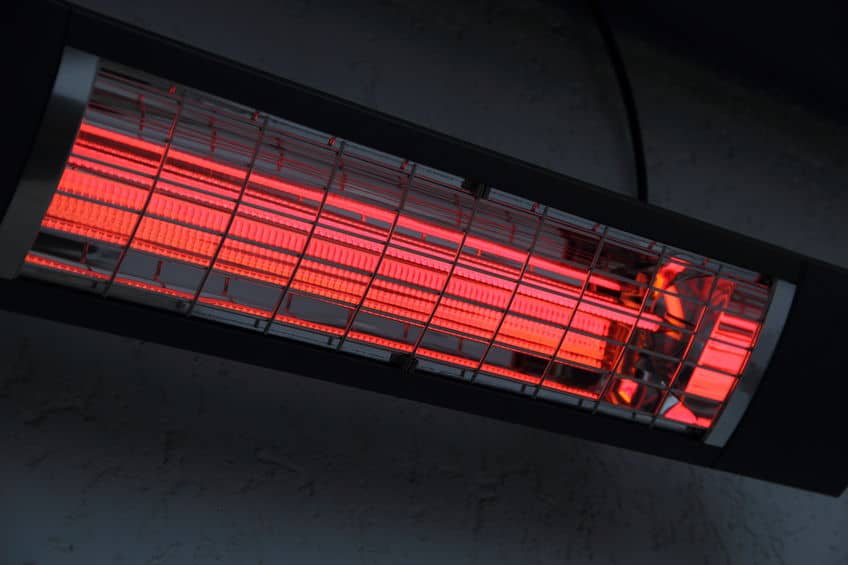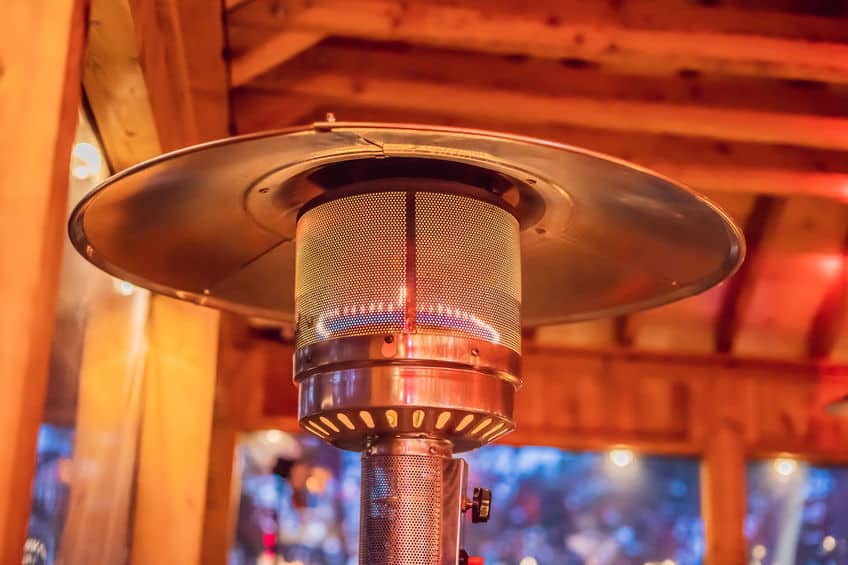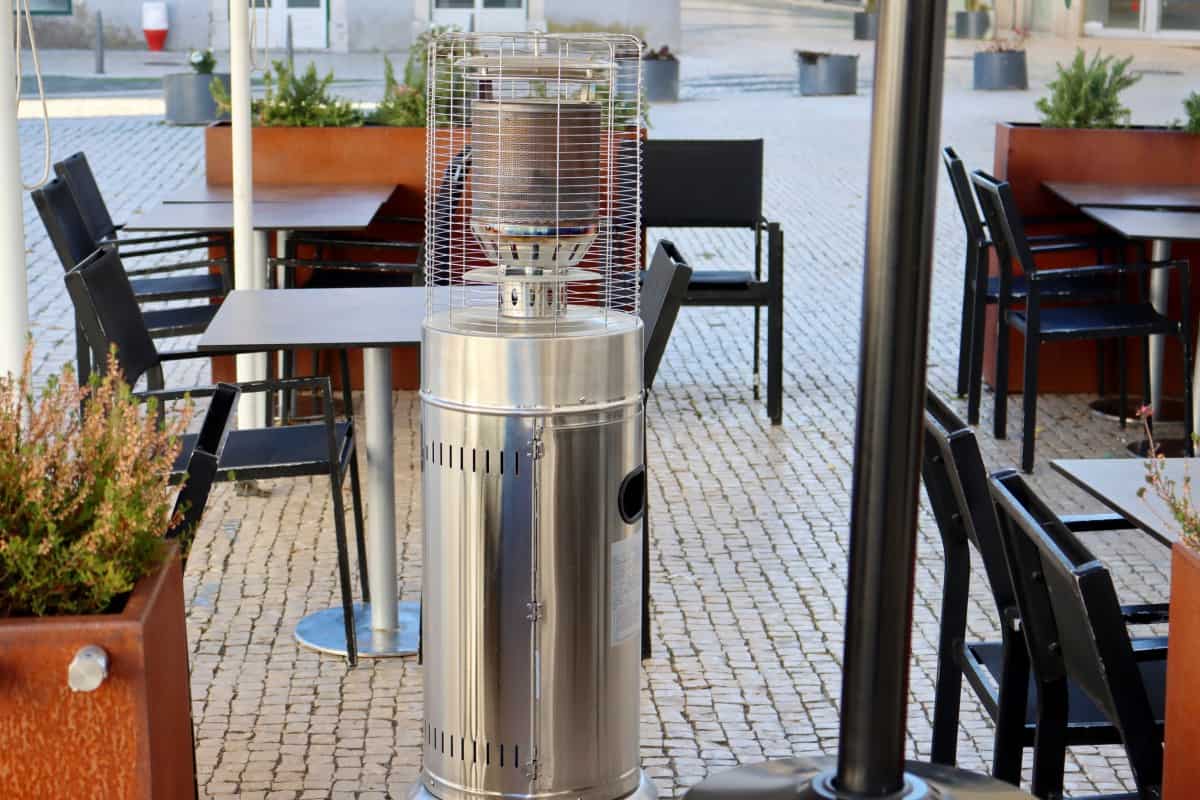Patio heaters are a great way to extend the outdoor entertaining season by adding comfort to the chilly spring weather or warmth to late fall. They are typically easy to maintain and keep running for years. However, what happens if yours gets louder?
Patio heaters should be quiet. A noisy heater indicates there is a problem. It could be any number of things depending on the type of heater you have. Problems could range from something simple like a dirty cover to something more serious like a motor issue.
Read on to get a better idea of what might be causing your patio heater to get loud…
Types of Patio Heaters
Picking the right model of patio heater will go a long way to ending any noise issue and will narrow down the types of maintenane issues you will have.
There are three types of patio heaters:
- Those that run off natural gas.
- Those that run off propane gas.
- Those that run off electricity.
Each type of heater has its unique set of maintenance checks, so noise could indicate a different problem in each type.
One thing that could eliminate noise is picking a quality heater from a well-recognized company. It is also good to select a patio heater than comes with a warranty that covers any future problems.
What Kind of Noise Does a Patio Heater Make?

Patio heaters are quiet. Most have a bug screen and may attract bugs so you may hear a zapping sound when a bug hits the screen but there shouldn’t be any other noise. An electric heater could have a gentle, light hum but that is barely noticeable.
A gas heater may make a sound when you first light the flame, but shouldn’t make a constant noise.
Are Electric Heaters Louder Than Gas?
There isn’t a remarkable difference of sound between an electric patio heater and its gas counterparts.
An electric heater may have the sound of a relay switch being turned on, but it shouldn’t be noticeable to you or your guests. Most electric heaters make no noise at all.
Common Problems Associated With Noise
Looking at consumer forums, it appears more people are asking questions about unusual noises with their gas-powered heaters than electric.
There could be several other reasons for this including:
- People grow more concerned over gas heaters since it involves an open flame.
- Electric patio heaters may be easier to diagnose.
Gas Patio Heaters

It appears those asking about a noisy patio heater are also having other problems at the same time, indicating there is one root problem associated with the noise.
For instance, one gas patio heater owner noticed the flames turned yellow after the noise began.
Noticing other differences in how your patio heater is operating is crucial to diagnosing the problem.
Whether you have an electric or gas patio heater, it is best to fix problems early on before they became a safety hazard.
Typical Problems With Gas Heaters
Most of the problems with gas heaters have nothing to do with noise. Instead, issues most people have concern flame.
Either the patio heater won’t stay lit, it blinks or there seems to be a problem with the gas transmission.
A gas heater has a simple design and that makes it easy to troubleshoot. All you need to do is go down a basic checklist to determine your problem.
It won’t give off light or heat. This is a case where the simplest explanation is the right one.
The gas level in your tank is low. This is a common problem with propane heaters than natural gas patio heaters as natural gas heaters are tied to a gas line.
The Hissing Noise
When the propane gas level is low, your patio heater it will make a type of hissing noise like it is pushing air through the hose.
Yet, there will be no flame. Turn off your heater and take out the gas cylinder.
A cylinder that feels too light indicates it is near empty or empty. Replace it with a full one and that should resolve your problem.
The Sound of a Burner
A working gas patio heater has some distinct sounds. One is the sound of gas arriving to the burner. Patio heaters with full cylinders will make this sound, which you can hear if you are close to the heater and quiet.
If you can’t hear the gas traveling through the system, there could be another problem.
The first thing to check on a patio heater with an electronic ignition system is a spark. A heater that has a spark but that will not light up could mean you have something wrong with the system. Be sure to stand back if it does light because it could flash.
One of the possible problems could be the gas pipe needs to be cleaned. You will need to disconnect the gas pipe from the gas inlet and the heater’s regulator. Then, you will need to push air through the pipe to clear it.
Hopefully, any blockages will dislodge and your heater will be functional again. T
The Rattling Noise
One possible issue occurring with both electrical and gas patio heaters is a slight rattling noise. The first thing to check in that situation is the bug screen.
Flames or light from the heater will naturally draw bugs. Every patio heater has a screen that prevents bugs from entering the heater core.
A dirty screen can result in both a rattling sound and a blockage that disrupts a gas flame.
It could also block some of the light from electrical heaters. You just need to clean the screen.
To do that, remove the screen and use an air blower to get rid of the dirt and dead bugs. Give it a quick wash and replace it.
Sudden Noises
There are cases where a heater can work fine but starts making a whirring noise after it has been on for a while. The first thing to do is look at the flame or light .
Those with a gas heater could see a difference in the color of the flame. This could indicate there isn’t enough primary air going through the system to cause the flame. With an electric heater, it could be something wrong with the motor.
Either way, this is a problem that you will probably need to seek professional help solving.
Electric Patio Heater Noises
Electric heaters should be quiet while they are running. You may hear them turn on or a slight noise as they run, but it shouldn’t be loud enough to disturb you or your guests.
A noisy electric patio heater will likely be one of two problems. It is either the fan or the motor.
The more common problem is a clogged or unstable fan. This is an easy thing to check. Disconnect the patio heater from the outlet.
Then, check the fan to make sure it isn’t clogged or unstable. You may need to plug the unit back in to watch the fan run.
If it isn’t moving at all, you will need to see if it is because it is clogged in an area or if there is a loose wire. Turn it off again to check those things.
Beyond the fan issue, there could be a motor issue. Those who don’t know much about motors should call a professional to look at your patio heater to ensure you don’t damage it further or cause a safety issue.
A Pinging Noise
An issue with an electric heater could show itself with a knocking or pinging sound when it is turned on. These unusual sounds can be loud. There are two possible explanations for this type of sound.
1. A loose heating element can rattle. The heating element is secured by brackets that support it. If it comes loose when it is heated, it can stretch and make noise.
2. It’s dirty. A patio heater that is dirty beyond the bug screen, whether it is dirt or dust, can start making popping sounds when it heats up. That is because the heat is burning the dirt up and it will start crackling and popping.
Beyond those two obvious, simple issues, you may have a motor problem that needs to be repaired.
Importance of Regular Maintenance
Any patio heater you have will need some basic, regular maintenance to keep it running quietly. Maintenance includes things like cleaning and lubricating it.
The most important thing you can do for your patio heater is clean it before you store it and again to remove dust before you use it for the first time the next season.
You may also want to check to see if the fan or any parts need lubrication before the season starts.
Conclusion
Fixing a noisy patio heater isn’t difficult because they are simple machines. It may take some patience to diagnose the problem, but most issues can be quickly remedied.
The best solution is to focus on ongoing maintenance to prevent similar problems in the future.
Alright guys, that’s it for this article, if you are interesting in reading more about patio heaters, we have lots of cool articles related such as:
Can Patio Heaters be Used on a Screened-in Porch? (Quick Facts)
7 Propane Patio Heater Accessories That Just MAKE SENSE!
Are Infrared Patio Heaters Any Good (Explained for Beginners)

